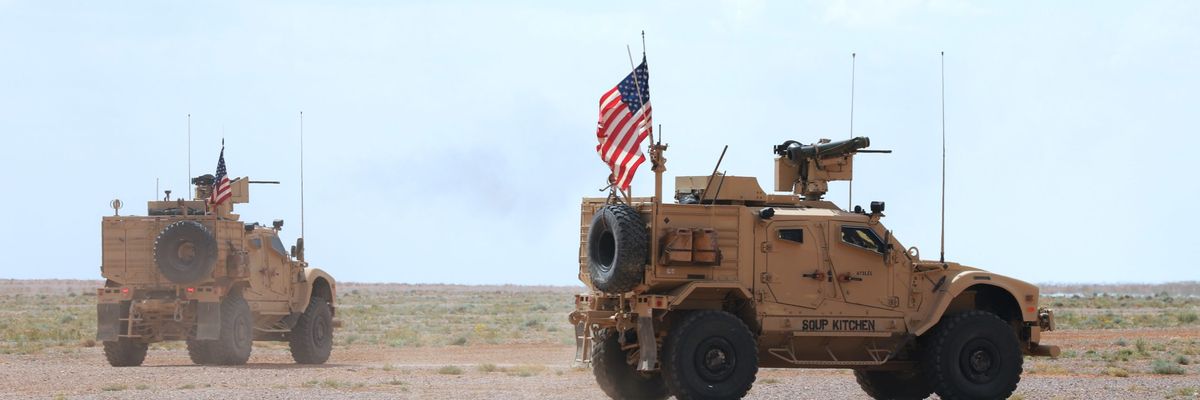In an interview with CBS News, former Deputy Secretary of State and current senior Biden campaign advisor Antony Blinken proposed a Syria policy that was largely a continuation of the status quo. He argued that the 200 U.S. special forces currently in Syria’s oil-rich eastern region should be used as “leverage” based on the fact that “the Syrian government would love to have dominion over those resources.” This is all too similar to President Trump declaring that “we have the oil” in regards to those same troops in Syria. Instead of continuing the same dead-end policy, the U.S. should embrace restraint and withdraw those troops for the sake of a secure and stable Syria.
While U.S. special forces stationed in al-Tanf base in eastern Syria may provide limited “leverage,” what is clear is that the immense risk involved in enforcing that leverage is not worth the vague hope that 200 troops will somehow deny the government of Bashar al-Assad, Iran, and Russia of victory.
It was a rocket attack on a U.S. base in Iraq that nearly led to a war with Iran earlier this year. It’s easy to envision such events being repeated at al-Tanf. Still, U.S. special envoy for Syria, James Jeffrey, found it acceptable to declare that the purpose of remaining in Syria is to create a “quagmire for the Russians” and “more of the same” for the Iranians. This policy will backfire in Syria as it did in Iraq.
ISIS’s caliphate is defeated. There is no reason to leave troops in a vulnerable position only to risk another endless war.
Instead, the U.S. should fully withdraw its forces from Syria and use its remaining leverage to facilitate diplomacy between Syria’s neighbors that are heavily enmeshed in the civil war. Recent diplomacy between Moscow and Ankara led to a ceasefire in a devastated Idlib, which helped encourage the return of tens of thousands of Syrians. However, the comprehensive diplomacy required for a costly Syrian recovery has yet to transpire. This is where the U.S. can help — not by adding to the plethora of competing forces.
In regard to its immediate diplomacy with Iran and Russia, two international agreements currently at risk are the JCPOA — or the Iran nuclear deal — and New START. The diplomacy and goodwill required for salvaging both agreements would be aided by a pivot to multilateral talks on Syria.
Intervention in Syria has been costly for both Russia and Iran, while leaving NATO ally Turkey concerned about future refugee influxes beyond the 3.6 million it currently holds. The many overlapping interests that facilitated limited diplomacy between these three states would lead to bigger results if U.S. policy were refocused on the diplomatic process rather than in the business of prolonging the civil war.
The details of a potential agreement would be difficult to predict, but the priorities of each party can be served by a U.S. military withdrawal.
Iran has spent more than $16 billion in Syria since 2012, while Russia has spent $2.5 to $4.5 billion since 2015. Although likely exaggerated, the claims coming out of Iran are much higher, with Senior Adviser to the Supreme Leader Ali Akbar Velayati claiming $8 billion a year, or approximately $64 billion over the same period. Regardless of the exact cost, Iran and Russia are going to want to reap the economic benefits of Syria’s reconstruction. A potential agreement can delineate investments from both countries. Iran, for example, is particularly keen to export fuel and other commodities, having already provided Damascus with three lines of credit for the same purpose valued at $6.6 billion. Turkey, on the other hand, will want reassurances regarding Kurdish militias on its border and the full return of refugees.
Washington’s role in such negotiations will be critical to piece these varying priorities together, and to facilitate humanitarian protections and goodwill.
First, with U.S. forces gone, it is more likely Ankara, Damascus, and the Kurds will return to the pre-war status quo. Syria will protect Kurds from Turkey, and Syria will protect Turkey from refugee flows, which will be significantly curtailed once the civil war ends.
Second, Washington should acquire assurances from Damascus to protect the rights of the Syrian people as they return home, while simultaneously accepting more refugees among those unable to return. This will make Syrians abroad more willing to resettle, while also helping stabilize the local economy. Damascus needs Syrians to return and rebuild the country, and with the closure of the civil war, even a dictator like Assad would be more likely to cooperate.
Third, the U.S. should remove sanctions, which were aimed at ousting Assad. Finally giving up on regime change, leftover sanctions hamper the recovery to the detriment of the Syrian people. Removing sanctions would engender cooperation from Moscow and Tehran, as well as Europe. Economic competition among those actors — all of which have a greater interest in Syria than the U.S. — would help protect Syrian sovereignty in the process and again give more reason for Syrians to return.
At the end, an agreement should protect the Syrian people, Syrian sovereignty, and allow for an international recovery effort as Damascus agrees to an inclusive political process. However, if the U.S. wants such a comprehensive deal to work, it will have to engage Syria’s authoritarian leader Bashar al-Assad. U.S. leaders should deal with the world as it is, not how they would like it to be.
The U.S. should divert reasonable energy to the diplomatic process, which has to date only involved the Russians, Turks, Iranians, and Syrians. Sitting on the sidelines removes non-military leverage, which is leverage the U.S. can keep at an acceptable cost.
Diplomacy is difficult and takes time. But it can work. Simply leaving 200 troops in eastern Syria as a substitute only serves to prolong the civil war. It may be counterintuitive in Washington, but restraint is the path towards successful diplomacy and resolution.
















